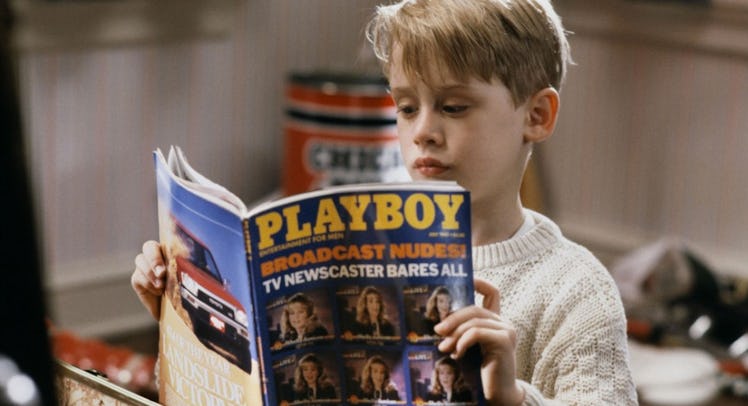Do Young Boys Who Watch Porn Grow Up To Hate Women?
Men become playboys or view women as weaker depending on age of first porn viewing.

When a boy sees pornography for the first time at a relatively tender age, he’s more likely to develop the misogynistic belief that women should be controlled by men, a new study suggests. And if he sees his first lewd image later on, he’s more likely to grow up to be sexually promiscuous. The findings, presented at the American Psychological Association, suggest that the age at which men first experience pornography may influence their attitudes about women and sex.
“We had expected that the lower age of first exposure would show stronger endorsement of these masculine norms based on basic learning theory,” coauthor on the study Christina Richardson of the University of Nebraska told Fatherly. Learning theory suggests that, the more exposure a person has to a certain message, the more likely he or she is to adopt it. “What we found instead is that it didn’t work that way for both masculine norms.”
Richardson and colleagues surveyed 330 predominately white undergraduate men. The men were asked about the age at which they were first exposed to pornographic material, and whether that exposure was forced, accidental or voluntary. (It’s important to note that the researchers did not look at the content of the pornography, or the medium. So the effects of the extremity of the pornography, or whether it was from the internet or a magazine, was not controlled for). The men were also asked a series of questions to find out whether they adhered to two well-established masculine norms—”Power Over Women” (feeling more comfortable when men are in charge and believing that women should be subservient) and “Playboy” (engaging in promiscuous sexual activity with multiple female partners).
Researchers found that the way in which men were exposed to their first pornography (that is, forced, accidental, or voluntary) surprisingly had little bearing on their adherence to those two masculine norms. However, the younger a man was at his first exposure to pornography, the more likely he was to adhere to the “Power Over Women” norm. Conversely, the older a man was at his first exposure, the more likely he would support the “Playboy” norm.
“That was one of the big surprises that we did not expect,” Richardson says.
Richardson acknowledges that the data does not prove causation—indeed, this study cannot demonstrate that early exposure to porn leads to misogyny, and it remains possible that an unrelated variable controls both conditions. For instance, it is not unlikely that the sort of child who has access to pornography at a tender age is also the sort of child who is exposed to other forms of misogyny. In any case, Richardson speculates that part of the effect may be due to the fact that the younger men are when exposed to their first pornography, the more time they spend failing to live up to the pornographic depictions of sex, leading to a longer period of anxiety and bad sex. This may lead to an evolution of their norms. “They might not want to be a playboy anymore because they’ve had negative sexual experiences,” she says.
And the research certainly adds to the growing body of evidence that long-term exposure to pornography can change the way men behave with women—and not for the better. “It’s been related to rape acceptance beliefs. It has been correlated with and predictive of actual sexual assault perpetration and domestic violence,” Richardson explains.
All that says, she does not endorse an idea that all men should stop watching pornography. She does, however, suggest men evaluate the genre of pornography they do watch, and ask critical questions about the messages they are receiving. She also suggests that the study should be a wake-up call for fathers, whom she sees as crucial to the development of healthy masculine ideals in their sons. “They can talk to their sons about what they’re watching and offer advice and a more rounded view of sexuality gender and relationships so that their sons aren’t getting all of their information from porn,” Richardson says. “Fathers can really step in and model what healthy masculinity looks like.”
This article was originally published on